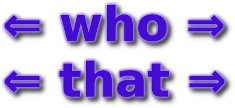Translating "who" / "that" into Chinese
 "Who” and “that” are often easily translated into Chinese as
谁
and
那个
. But there is another usage of these words that can be tricky to translate: when they’re used ‘structurally’ to link clauses together.
"Who” and “that” are often easily translated into Chinese as
谁
and
那个
. But there is another usage of these words that can be tricky to translate: when they’re used ‘structurally’ to link clauses together.
The grammar of this in English is pretty complicated so I won’t go into it in detail here. Instead, a couple of examples:
“We went to the café that I told you about.”
“There’s a policeman outside who wants to see you.”
In these cases you definitely can’t translate “that” as 那个 or “who” as 谁 , so how should you do it? There are a few different ways, depending on the situation.
No connector
Happily, you often don’t need to use any kind of connector in Chinese. You can just add on the second clause as it is and let the listener make sense of it. This is perfectly grammatical in Chinese.
Some examples:
外面有一个警察想见你。 Wàimiàn yǒu yīgè jǐngchá xiǎng jiàn nǐ. "There's a policeman outside *who* wants to see you."
这正可以说明你是个骗子。 Zhè zhèng kěyǐ shuōmíng nǐ shìgè piànzi. "That just goes to show *that* you are a liar."
这证明了你是杀人犯。 Zhè zhèngmíngleyou nǐ shì shārén fàn. "This is proof *that* you're the murderer."
Use 的
In some situations, the best option is to use 的 to convert the part of the sentence with “who” or “that” into a noun phrase. This sounds complicated, but it’s fairly easy to get the hang of.
的 is used to attribute qualities to things. You commonly see it used to link adjectives to nouns. It can also be used to convert actions into qualities, so that they can be used like adjectives in a sentence.
This is probably clearest with some examples:
我们去了我告诉过你的咖啡店。 Wǒmen qùle wǒ gàosuguò nǐ de kāfēi diàn. "We went to the café *that* I told you about."
Here, the phrase “that I told you about” has been made into a quality by using 的 : “我告诉过你的" . Then it can easily be slotted into the sentence as if it were an adjective.
Notice how the sentence in Chinese is literally “We went to the I told you about café.” The phrase “I told you about” functions like an adjective, going in the slot that words like “best” or “old” would go in.
More examples:
我从来没有认识过一个不喜欢巧克力的人。 Wǒ cónglái méiyǒu rènshiguò yīgè bù xǐhuan qiǎokèlì de rén. "I've never met someone *who* doesn't like chocolate."
世界上有10种人:懂二进制的人和不懂二进制的人。 Shìjiè shàng yǒu 10 zhǒng rén: Dǒng èrjìnzhì de rén hé bù dǒng èrjìnzhì de rén. "There are 10 types of people in the world: those *who* understand binary, and those *who* don't." [(from Tatoeba)](http://tatoeba.org/eng/sentences/show/502739 "Sentence nº502739 - Tatoeba")
这是我吃过最好吃的蛋糕。 Zhè shì wǒ chīguò zuì hǎochī de dàngāo. "This is the best cake *that* I have ever eaten."
自从我认识她的时候,我就恨她。 Zìcóng wǒ rènshi tā de shíhou, wǒ jiù hèn tā. "From the moment *that* I met her, I hated her."
Split, add in a pronoun
Very long sentences containing “who” or “that” can be very awkward to translate using 的 . Technically, you can produce one very long modifying phrase, but in a lot of cases it produces a monster sentence that’s just too hard to follow.
In these cases, a good option is to split the sentence up. Give the information after “who” or “that” in the first chunk, then add in the rest in another chunk.
This can seem like you’re changing the meaning, but what’s more important in most translation is the intended meaning. Different languages might be more or less explicit in how they cover this, so you have some licence to change the sentence a little in translation.
Some examples:
对于那些连基本事实都搞不清楚而且又盲目得无法了解到这一点的人,我从来都不知道对他们说些什么。 Duìyú nàxiē lián jīběn shìshí dōu gǎo bù qīngchu érqiě yòu mángmù dé wúfǎ liǎojiě dào zhè yīdiǎn de rén, wǒ cónglái dōu bù zhīdào duì tāmen shuō xiē shénme. "I never know what to say to people *who* have absolutely no grasp of the basic facts and are too ignorant to realise it."
虽然她知道那家公司不但对当地官员行贿而且也给她的家人带了了极大的麻烦,可她还是应聘了那家公司的一份工作。 Suīrán tā zhīdào nà jiā gōngsī bùdàn duì dāngdì guānyuán xínghuì érqiě yě gěi tā de jiārén dàiliǎoliǎo jídà de máfan, kě tā háishì yìngpìnle nà jiā gōngsī de yī fèn gōngzuò. "She applied for a job at the company *that* had not only bribed local officials but also caused huge problems for her own family."
Useful links
- [Search for “that” example sentences on Tatoeba](http://tatoeba.org/eng/sentences/search?query=that&from=eng&to=cmn ““That” English - Chinese translations - Tatoeba”)
- [Search for “who” example sentences on Tatoeba](http://tatoeba.org/eng/sentences/search?query=who&from=eng&to=cmn ““Who” English - Chinese translations - Tatoeba”)
Got questions? Suggestions? Is something unclear here? Please share all in the comments!
